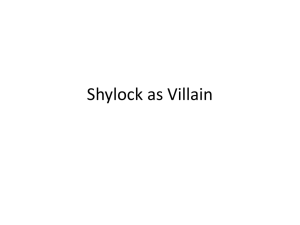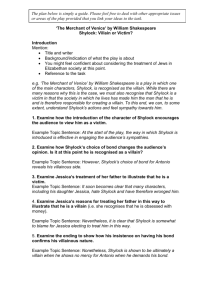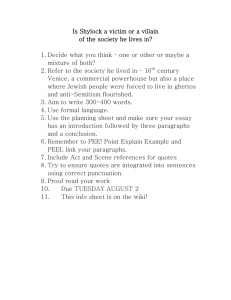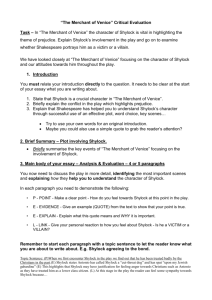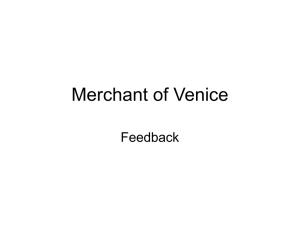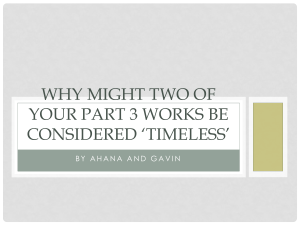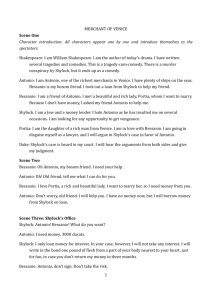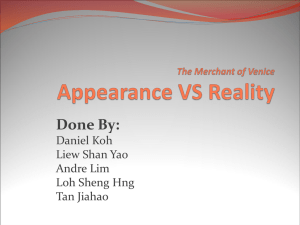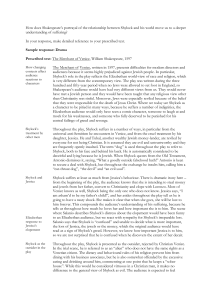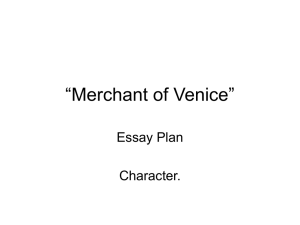The Merchant of Venice Essay Help
advertisement
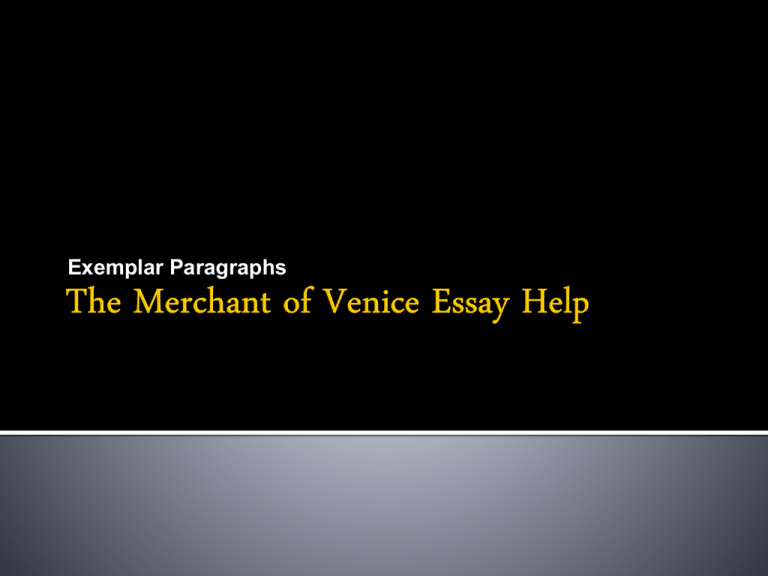
Exemplar Paragraphs Shylock: The complexity and success of Shylock’s character depends on how the audience perceive him. Discuss whether you think that Shakespeare intended Shylock to be portrayed as “villain or victim”? Use TART to structure. The Merchant of Venice’ by William Shakespeare is a play with a complex main protagonist. Many have thought Shakespeare himself to harbour anti-Semitic feeling through his depiction of Shylock; whereas others believe Shylock to be his outcry against this very thing. This can be seen through his multi-faceted depiction of Shylock and the difficultly the audience have in placing him as either victim or villain. I will attempt to discuss the portrayal of Shylock’s character through Shakespeare’s use of language, stage directions, character… The Oxford dictionary defines a villain as “a person or thing responsible for specified problems, harm, or damage” and whilst it is probably true that Shylock could fit this definition; we are left to question whether or not he is the only one. In addition, we are left pondering if it is because of this very “harm and damage” endured at the hands of a Venetian Christian society that Shylock is compelled into the action that he takes within the play or if it is down to his own deep-rooted religious prejudice. This conflict is central to the ideas explored in the play and provide the crux of the dilemma surrounding Shylock's character – did Shakespeare desire to portray a villain or a victim though the complex protagonist of Shylock? I intend to examine this through examination of Shakespeare’s use of dramatic techniques. From the outset of the play, Shylock is depicted as a character who is obsessed with money. This is reinforced when the audience learn of his means of employment, as a Jewish moneylender, and of the root of his feelings towards Antonio: “Shylock (aside): How like a fawning publican he looks. I hate him for he is a Christian; but more, for that in low simplicity He lends out money gratis and brings down the rate of usance here with us in Venice.” (Act Iiii 38-48) The stage direction used here reveals to the audience Shylock’s true feelings regarding Antonio and the basis of his hatred of him, incited not only by religious prejudice “but more” for financial and business reasons. Shylock’s condemnation of Antonio as a “fawning publican” gives an insight to the root of his dislike of Antonio as somebody who openly mistreats the Jewish community, collecting taxes, in order to win favour in the eyes of those in power in Venice, suggested by the word “fawning,” a slight on Antonio’s character. In addition Shylock feels vindicated in his profession as this was one of the only means of employment open to Venetian Jews. However, ironically this is the root of his scorn and mistreatment at the hands of Christian Venice, as Christianity does not condone the idea/ practice of lending money for interest. With this context in mind, Shylock’s unnatural concern with money seems even slightly excusable, whereas his blatant hatred based upon religious difference seems completely unjustified at this point in the play; especially when Antonio has been cast initially in the role of kind-hearted and loyal friend to Bassanio. When we are next introduced to Antonio, the initial impression that the audience have of him, is altered by his complete disregard and callous treatment of Shylock: “You call me misbeliever, cut-throat dog, And spit upon my Jewish gaberdine, And all for use of that which is mine own”… This reveals the true extent of the mistreatment that Shylock has suffered at the hands of Venetian Christians as Antonio’s sickening actions here convey a complete lack of dignity for a fellow human being as he treats Shylock as nothing more than a lowly animal based upon his Jewish identity. This allows the audience feel some sense of sympathy for Shylock and his earlier ill-feeling as we are repulsed by Antonio’s actions in this scene. This feeling is further enhanced by Antonio’s complete lack of remorse when he says “ I am as like to class thee so again, To spit on thee again, to spurn thee too” despite the fact that he is the one seeking something from Shylock. This highlights just how justified the Christian community felt the were in their treatment of Jewish people and how appalling this was. This serves to highlight the theme of religious prejudice upon which the central conflict of the play hinges and make it much less clear-cut as to who is really the villain and who is the victim. Shylock (aside) How like a fawning publican he looks. I hate him for he is a Christian; but more, for that in low simplicity He lends out money gratis and brings down the rate of usance here with us in Venice.” (Act Iiii 38-48) “Three thousand ducats, well” (Act Iiii onwards) “(aside) How like a fawning publican he looks. I hate him for he is a Christian; But more that in low simplicity he lends out money gratis and brings down the rate of usance here with us in Venice.” (Act Iiii lines 38 onwards) “You call me misbeliever, cut-throat dog, And spit upon my Jewish gaberdine, And all for use of that which is mine own”… (Act Iiii103-126) “As the dog Jew did utter in the streets: ‘My daughter! Oh my ducats! Oh my daughter! Fled with a Christian! Oh my Christian ducats! Justice! The law! My ducats and my daughter! (Act II 8) “I am a Jew. Hath not a Jew eyes? Hath not a Jew hands, organs, dimensions, senses, affections, passions; fed with the same food, hurt with the same weapons”…(III.i.49–61) “What if my house be troubled with a rat, And I be pleased to give ten thousand ducats To have it baned? What, are you answered yet?”... (IV.i.43–61) “You have among you many a purchased slave/Which, like your asses and your dogs and mules, You use in abject and in slavish parts Because you bought them. Shall I say to you’Let them be free, marry them to your heirs. Why sweat they under burdens?”. . .(IV.i.89–99)
